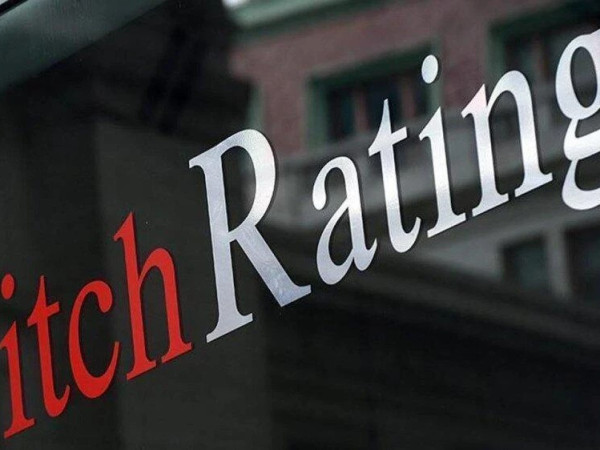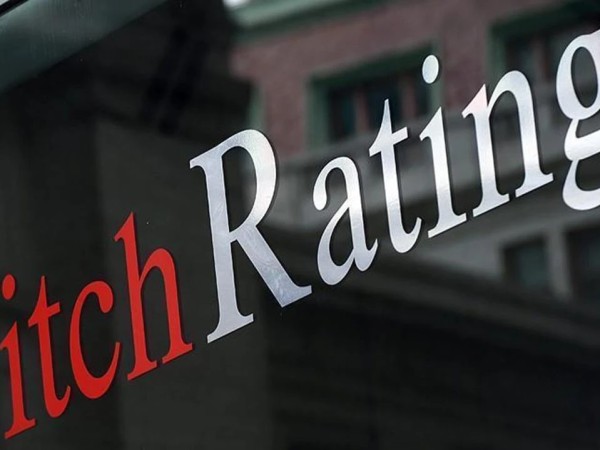KEY RATING DRIVERS
Georgia's ratings are supported by strong structural indicators, such as governance and business environment, relative to 'BB' category peers.
A consistent and credible policy framework underpins Georgia's relative resilience to shocks. These credit strengths are balanced by a high share of foreign-currency denominated government debt, low external liquidity and higher external financing requirements relative to peers.
The Negative Outlook reflects the significant ongoing impact of the coronavirus pandemic on Georgia's economy. The pandemic is causing a sharp contraction of Georgia's small open economy with a large tourism sector, a marked deterioration in fiscal accounts, including higher government debt, and increased vulnerabilities stemming from Georgia's higher external debt and wider structural current account deficit relative to the median of its 'BB' category peers.
Fitch forecasts real GDP growth of 4.3% in 2021 and 5.8% in 2022, after a pandemic-driven contraction estimated at 6.1% in 2020. Fitch projects Georgia's economic recovery at a faster pace than the median growth rates of its 'BB' peers (4.0% in 2021 and 3.7% in 2022). The main downside risks to our baseline relate to uncertainties attached to the evolution of the pandemic and the efficacy of the vaccination rollout. GDP growth will be predominately domestic demand driven, as easing of national restrictions supports private consumption, and higher than historical public infrastructure spending drives investment despite subdued private sector recovery. Net exports of goods should benefit from increased demand from key trading partners. The recovery will remain constrained by the tourism sector: we expect revenues at 30% of 2019 levels in 2021, rising to 80% in 2022.
The National Bank of Georgia's (NBG) track record of credible policy making has been important in preserving macroeconomic and financial stability, and limiting balance of payments risks in previous economic shocks as well as the current global pandemic. A mix of macro-prudential measures and interventions in the foreign exchange market have supported financial stability and smoothed exchange rate volatility. Georgia's economy is highly dollarised, small and highly open (trade openness is 60.9% of GDP, well above the 46.5% median of 'BB' peers). However, a credible policy framework has kept both Georgia's CPI and REER volatility indicators below the historical median volatility of 'BB' peers since 2012.
We anticipate that the NBG will maintain a moderately tight monetary policy stance in the near term to anchor inflation expectations against pressures stemming from higher commodity prices, recovery in aggregate demand and the impact of a weaker lari. Headline inflation fell below the NBG's target of 3.0% in December 2020, reflecting temporary government utilities subsidies for consumers, and we forecast it to average 3.5% in 2021.
Fiscal policy will remain accommodative in 2021, as authorities continue to provide targeted support for individuals and businesses affected by the pandemic. This includes the continuation of income tax relief for businesses that retain low wage workers, the credit guarantee scheme for small and medium enterprises (SMEs), as well as social transfers for vulnerable households and the unemployed. Measures outlined in the 2021 budget total 2.1% of GDP according to the government.
This compares with measures around 3.9% of GDP in measures in 2020. Fitch estimates this will result in a fiscal deficit 8.0% of GDP in 2021, from 9.4% of GDP in 2020. This compares with the 2021 projected median deficit of 'BB' peers at 5.7%. We expect the government to return to gradual fiscal consolidation from 2022. Combined with stronger economic activity, we forecast narrowing of the deficit to 5.0% of GDP in 2022.
Government deposits reached 9.4% of GDP at the end of 2020, up from 4.7% in 2019, due to overfinancing from official creditors to create a buffer. 2021 budget financing needs should be comfortably met partly by drawing down donor pledges and government deposits. Plans to refinance an upcoming Eurobond maturing in April (USD500 million) will help maintain foreign exchange reserves.
Georgia's general government debt is estimated by Fitch to have increased by 20pp in 2020 to 60.4% of GDP, slightly above the median debt ratio of 'BB' peers (59.9% of GDP). We forecast debt to stay around this level in 2021, before declining to 56.5% in 2022. The elevated debt level, largely in official debt, has also meant a deterioration in Georgia's negative sovereign net asset position, to 24.4% of GDP in 2020 from 15.1% in 2019.
The economic recovery and commitment by the government to return to its fiscal rule by reaching a deficit below 3.0% of GDP by 2024, will support medium-term debt reduction. Georgia's prudent fiscal record coming into the pandemic and continued engagement with the IMF (currently through an Extended Fund Facility; EFF) means Fitch expects the authorities will adopt policies in fiscal consolidation once the pandemic subsides. Debt sustainability is underpinned by a large share of multi and bilateral debt (approximately 72% of total debt) with long average maturities and low interest costs. However, a large share of foreign-currency debt (74.8% of total debt) leaves the sovereign exposed to exchange rate risk.
Contingent liabilities remain a fiscal risk. Upcoming gross financing requirements of state-owned enterprises (SOEs) equal around 18% of GDP over 2020-2022. Authorities have made good progress improving the transparency of fiscal risks from SOEs, and aim at further reform of the sector.
Georgia's current account deficit (CAD) is estimated by Fitch to have widened to 12.0% of GDP in 2020 from 5.5% of GDP in 2019. Goods exports fell less than expected, helped by a relatively well diversified base of trading partners, and remittance inflows were surprisingly strong. However, services exports were significantly affected by the halt to inward tourism. We forecast Georgia's CAD to widen to 12.5% of GDP in 2021, before narrowing to 7.9% in 2022. A domestic driven recovery and a weak outlook for tourism will mean a higher pace of growth in imports than exports.
Georgia's weaker external finances relative to the 'BB' rated category, are also reflected by its significantly larger net external debt position (73.9% of GDP vs the historical 'BB' median of 9.7% of GDP), and lower external liquidity ratio (112.6% vs the historical 'BB' median of 141.8%). These weaknesses are partially offset by a demonstrated record of strong donor support to meet external financing needs and help preserve external buffers and current external payments (CXP) coverage. Foreign reserves reached a historical peak of USD3.97 billion at end 2020 (4.5 months of CXP cover), boosted by donor financing.
Fitch revised the Outlook on Georgian banks' ratings to Negative in April 2020. Uncertainty related to the economic recovery, risks attached to a high share of foreign-currency loans (55.3% at end-2020), and the eventual unwinding of government support measures, will likely result in a deterioration of banks' asset quality, earnings and capitalisation. Non-performing loans (NBG methodology) increased to 8.2% of gross loans at end-2020, from 4.4% end-2019.
The sector regulatory Tier 1 capital ratio declined to 12.8% at end-2020, from 14.6% at end-2019 due to pre-emptive provisioning in 1Q20 amounting to 3% of sector loans. Fitch believes asset quality trends will be key for banks' performance in 2021.
The re-election of Georgian Dream (after parliamentary elections in October 2020) reinforces our expectation of economic policy continuity and we do not see this being disrupted, despite high political tensions given the current boycott of parliament by key opposition parties. Georgia's governance and ease of doing business indicators outperform the median percentile of its 'BB' peers, and commitment to the current IMF EFF programme helps maintain a positive structural reform agenda. We expect Georgia to agree a successor deal with the Fund when the EFF expires in April.
ESG - Governance: Georgia has an ESG Relevance Score (RS) of 5 for both Political Stability and Rights and for the Rule of Law, Institutional and Regulatory Quality and Control of Corruption, as is the case for all sovereigns. Theses scores reflect the high weight that the World Bank Governance Indicators (WBGI) have in our proprietary Sovereign Rating Model. Georgia has a medium WBGI ranking at 63.0 percentile, reflecting moderate institutional capacity, established rule of law, a moderate level of corruption and political risks associated with the unresolved conflict with Russia.
RATING SENSITIVITIES
Factors that could, individually or collectively, lead to negative rating action/downgrade:
- Public Finances: Deterioration in the debt-to-GDP ratio for example, due to the absence of fiscal consolidation and/or deterioration in growth prospects.
- External Finances: An increase in external vulnerability, for example, a sustained widening of the CAD and rapid decline in international reserves.
- Structural Features: Deterioration in either the domestic or regional political environment that affects economic policy-making and economic growth.
Factors that could, individually or collectively, lead to positive rating action/upgrade:
- Public Finances: Fiscal consolidation post-coronavirus crisis that is consistent with a medium-term reduction in general government debt.
- External Finances: A reduction in external vulnerability, for example from a reduction in the current account deficit and/or increase in international reserves.
- Macroeconomics: A stronger and sustained GDP growth outlook, without the emergence of macroeconomic imbalances and leading to a higher GDP per capita level.
SOVEREIGN RATING MODEL (SRM) AND QUALITATIVE OVERLAY (QO)
Fitch's proprietary SRM assigns Georgia a score equivalent to a rating of 'BB' on the LTFCIDR scale.
Fitch's sovereign rating committee adjusted the output from the SRM to arrive at the final LTFC IDR by applying its QO, relative to rated peers, as follows:
- External Finances: -1 notch, to reflect that relative to its peer group, Georgia has higher net external debt, structurally larger CADs, and a large negative net international investment position.
- Macroeconomic policy: +1 notch, to reflect Georgia's policy framework strength and consistency, including a credible monetary policy framework, prudent fiscal strategy and a strong record of compliance with IMF's quantitative performance criteria and structural benchmarks. This policy mix has delivered track record of resilience to external shocks, including negative developments in its main trading partners, and reduced risks to macroeconomic stability.
BEST/WORST CASE RATING SCENARIO
International scale credit ratings of Sovereigns, Public Finance and Infrastructure issuers have a best-case rating upgrade scenario (defined as the 99th percentile of rating transitions, measured in a positive direction) of three notches over a three-year rating horizon; and a worst-case rating downgrade scenario (defined as the 99th percentile of rating transitions, measured in a negative direction) of three notches over three years. The complete span of best- and worst-case scenario credit ratings for all rating categories ranges from 'AAA' to 'D'. Best- and worst-case scenario credit ratings are based on historical performance. For more information about the methodology used to determine sector-specific best- and worst-case scenario credit ratings, visit [https://www.fitchratings.com/site/re/10111579].
KEY ASSUMPTIONS
The global economy performs broadly in line with Fitch's latest Global Economic Outlook published on 7 December 2020. We estimate eurozone real GDP to have fallen by 7.6% in 2020, and forecast it to recover by 4.7% in 2021 and 4.4% in 2022.
REFERENCES FOR SUBSTANTIALLY MATERIAL SOURCE CITED AS KEY DRIVER OF RATING
The principal sources of information used in the analysis are described in the Applicable Criteria.
ESG CONSIDERATIONS
Georgia has an ESG Relevance Score of 5 for Political Stability and Rights as World Bank Governance Indicators have the highest weight in Fitch's SRM and are highly relevant to the rating and a key rating driver with a high weight.
Georgia has an ESG Relevance Score of 5 for Rule of Law, Institutional & Regulatory Quality and Control of Corruption as World Bank Governance Indicators have the highest weight in Fitch's SRM and are therefore highly relevant to the rating and are a key rating driver with a high weight.
Georgia has an ESG Relevance Score of 4 for Human Rights and Political Freedoms as strong social stability and voice and accountability are reflected in the World Bank Governance Indicators that have the highest weight in the SRM. They are relevant to the rating and a rating driver.
Georgia has an ESG Relevance Score of 4 for Creditor Rights as willingness to service and repay debt is relevant to the rating and is a rating driver for the Georgia, as for all sovereigns.
Except for the matters discussed above, the highest level of ESG credit relevance, if present, is a score of 3. This means ESG issues are credit-neutral or have only a minimal credit impact on the entity, either due to their nature or to the way in which they are being managed by the entity. For more information on Fitch's ESG Relevance Scores, visit www.fitchratings.com/esg.















